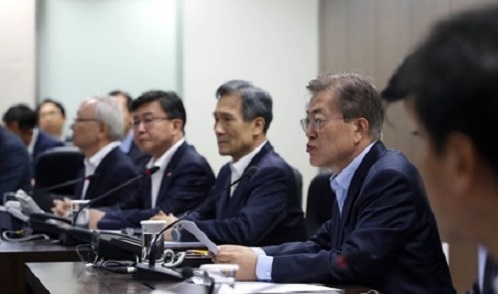North Korea on Friday sent a critical message via its official media to the newly launched liberal South Korean government over its policy that pursues the North's denuclearization and seeks dialogue at the same time, claiming that dialogue can never be compatible with confrontation.
The criticism followed South Korean President Moon Jae-in's unexpectedly tough response to the North's latest test-fire of a new kind of an intermediate-range ballistic missile, called the Hwasong-12, the first military provocation since Moon's inauguration. At a national security meeting on Sunday, Moon said dialogue is possible only in case of North Korea changing its attitude.
 |
President Moon Jae-in (2nd from R) presides over a National Security Council meeting at the presidential office Cheong Wa Dae in Seoul on May 14, 2017, to discuss North Korea's missile launch earlier in the day. (Yonhap) |
"Confrontation in parallel with dialogue is an incompatible sophistry," the (North) Korean Central News Agency said in a commentary contributed by an individual named Kim Myong-chol.
The late former South Korean President Park Chung-hee's biggest crime was to have abandoned basic inter-Korean unification agreements and clung to vicious plots to instigate inter-Korean confrontation, while talking big over "confrontation in parallel with dialogue," said the commentary, titled "(Moon) should learn a lesson from its dictator's (Park) sin against inter-Korean unification."
"It's obvious that (the two Koreas) can never achieve national reconciliation and improve inter-Korean relations while instigating fratricidal animosity and confrontation," the commentary said.
National independence and peaceful unification also cannot be materialized as long as the South follows foreign forces that plot to divide the Korean Peninsula permanently and invade the North, the commentary said.
"(The Moon government) should make a resolute departure from an outdated era of mistrust and hostility if it really wants to better inter-Korean ties and realize reunification," it said. (Yonhap)






![[Exclusive] Hyundai Mobis eyes closer ties with BYD](http://res.heraldm.com/phpwas/restmb_idxmake.php?idx=644&simg=/content/image/2024/11/25/20241125050044_0.jpg)
![[Herald Review] 'Gangnam B-Side' combines social realism with masterful suspense, performance](http://res.heraldm.com/phpwas/restmb_idxmake.php?idx=644&simg=/content/image/2024/11/25/20241125050072_0.jpg)
